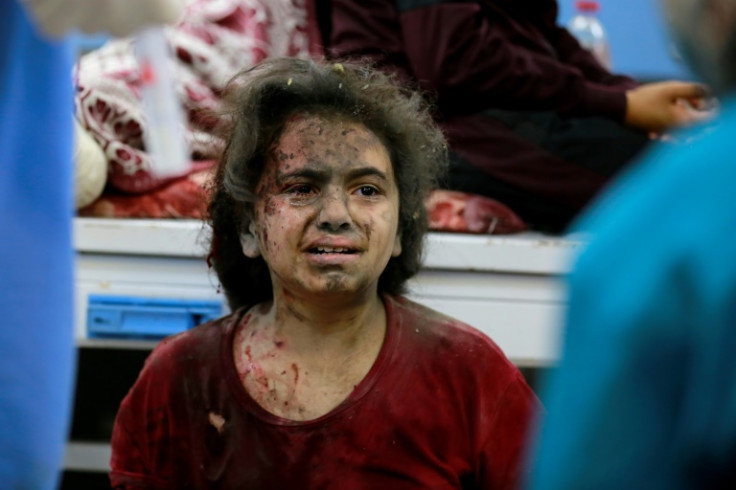What Trauma Will Gaza's Children Face After The Israel-Hamas War?
A Save the Children report reveals that before Oct 7, more than half of Gaza's children had suicidal thoughts and three in five of the children were already engaging in self-harm.

The constant strikes on Gaza, conducted by the Israeli Defence Forces (IDF) in response to Hamas' unprecedented attack on Israel's civilians on Oct 7, have intensified the already perilous situation for Palestinian children.
According to the Hamas-run Health Ministry in Gaza, more than 14,000 people have been killed by Israel's airstrikes, including more than 5,500 children in the besieged enclave.
Around 40 per cent of Gaza's population, prior to the escalated conflict, are under the age of 18, according to a UNICEF report that also notes that an average of 400 children have been killed or injured every day since Oct 7.
In a recent report, UNICEF also said that "almost every child in the Gaza Strip" has been exposed to extremely distressing events and witnessed trauma.
Ayesha Kadir, a Senior Humanitarian Health Advisor for Save the Children, also noted: "Children with conflict exposure have been found to have higher rates of anxiety, depression and psychosomatic complaints."
A Save the Children report, published last year, exposed that more than 50 per cent of the children in Gaza had suicidal thoughts. The report, which studied Palestinian youngsters, also found that three in five of the children were already engaging in self-harm.
Kadir recognised that, with a "truce agreement" signed, it would be hard to combat the psychological stress that the youngsters have endured in the past month and a half.
"Children do not express psychological distress in a single way. Some may act out, others may withdraw," she explained.
The Consultant in Paediatrics continued to predict: "They may act younger than their age, start bedwetting, have trouble sleeping, refuse to eat or have internalising effects such as stomach aches or headaches."
According to Kadir, it is also important to acknowledge that while "not all children who experience trauma are traumatised", the "experience of conflict is a form of toxic stress, which has both physical and psychological".
A Doctor embraces a child and tries to calm him down whilst he was shaking from fear in one of the hospitals in Gaza.😭 Ya Allah 😥 pic.twitter.com/etrrSvuqdT
— aisha.pti❤💚 (@only_kaptaan) November 22, 2023
This week, media outlets on the ground in the Strip reported that eight premature babies had died after life-saving medical equipment was put out of use due to fuel restrictions.
On Sunday, as part of an operation facilitated by the Palestinian Red Crescent Society (PCRS), together with several other national humanitarian organisations, 31 babies were transferred from Gaza's largest hospital to Emirati Hospital in the southern city of Rafah.
Two of the premature infants did not travel to Egypt, however, the remaining babies were evacuated through the Rafah crossing to Egypt from hospitals in Gaza this week.
The babies were transferred from the al-Shifa Hospital, located in Gaza City, and have since been moved to seek treatment at Al-Arish General Hospital and the New Administrative Capital Hospital in Cairo.
Ahmad, a Doctor who works at Al-Arish General Hospital, located in the Sinai Peninsula of Egypt, told reporters: "We have been waiting for them during the past few days. We have made all the preparations to receive the newborn babies with all the medical equipment needed for that."
Some of the babies need "more advanced medical measures", he added.
Regarding the impact that the relentless bombardment has on children in Gaza, a Palestinian mother to one of the premature infants spoke to reporters about how the events have impacted her daughter's life.
Before Israel declared war on Gaza, after a traumatic and early birth on September 28, Lubna El-Seik said that her daughter was placed in an incubator at al-Shifa Hospital.
El-Seik continued to explain: "Then they asked us to leave our house, then they bombed our house. So, I went to Al Shifa Hospital. It never occurred to us that the hospital would be targeted and that those children would have to go through what they went through."
© Copyright IBTimes 2024. All rights reserved.






